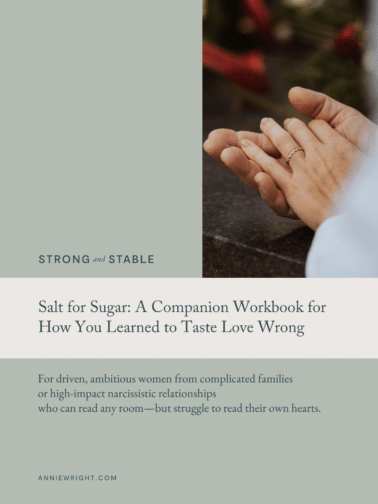TL;DR –The very act of questioning "Was my childhood traumatic?" often contains its own answer—people from healthy childhoods don't google this phrase at 2 AM or find the question boomeranging through their minds. Trauma isn't just dramatic events but can be "enduring conditions"—repeated experiences over time that overwhelmed your ability to cope, whether that's emotional neglect, witnessing parental rage, or living with the threat of abandonment. Your nervous system doesn't measure trauma by objective standards but by whether you had the resources to process what happened, which is why siblings can have completely different experiences of the same household.
The validation comes from multiple sources: understanding trauma's clinical definition (experiences that overwhelm coping capacity), taking the ACE assessment that objectively identifies adverse experiences, and most importantly, honoring your subjective reality. If your brother says childhood was fine but you felt terrorized by your father's unpredictability, both realities are valid—trauma is the unique individual experience. What matters isn't whether your childhood was "bad enough" by some external measure, but whether certain experiences overwhelmed your developing nervous system's ability to integrate them, leaving impacts that still affect you today.
Often I’ll receive emails or comments on my blog posts asking me questions to the effect of, “Annie, this is what happened to me in my childhood. So was my childhood traumatic?”
The answer to this question is never simple. It’s complex. And it bears answering in a thoughtful, deliberate way.
If you, like so many of my readers, have ever asked this question about your own past, today’s essay is for you.
Was my childhood traumatic?
First, I want to acknowledge that if you’re even asking this question, there’s some small part of you that already has the answers you may need.
In my experience, people who don’t come from abusive, dysfunctional, or traumatic childhoods don’t even entertain this question.
They barely let the thought occupy a moment of their time. It takes up no real estate in their mind.
They feel secure and comfortable in their experience and wouldn’t ever call it traumatic.
They see that question on the screen or hear it spoken out loud, and they move on.
But for those of us who come from dysfunctional, abusive, or chaotic backgrounds, even if we gloss over the question initially, it boomerangs. It comes back.
Stickier, less clear, foggier.
It rebounds in our mind, in our heart, our psyche.
The question begs our attention: “Was my childhood traumatic?”
It’s not a comfortable question, is it?
And to answer it, should we choose to give the question our attention, we can consider a few things:
- What is the definition of trauma?
- What does the ACE’s study have to say about my background?
- What is my subjective reality?
Let’s unpack each of these considerations.
What is the definition of trauma?
In my decade of clinical work, the best definition I’ve found of trauma is this:
Trauma is the unique individual experience of an event or enduring conditions in which the individual’s ability to integrate his/her emotional experience is overwhelmed and the individual experiences (either objectively or subjectively) a threat to his/her life, bodily integrity, or that of a caregiver or family. (Saakvitne, K. et al, 2000).
There are two parts of this definition that I want to highlight.
First, “trauma is the unique individual experience.”
By this definition we see that psychological trauma is subjective and relative – meaning what makes something traumatic for one person may not be traumatic for another depending on what our ability to deal with it is (more on this later in the essay).
The key, though, across subjective experiences, is that it overwhelms the individual’s ability to cope with it.
That’s what makes something traumatic – the fact that it overwhelms our ability to cope.
And there’s another part of this definition that I want to draw attention to: “enduring conditions.”
Typically and historically, trauma has been thought of as an isolated and discrete event: a car crash, a bombing, a rape, military service.
And certainly, all of these are examples of what could be traumatic for someone.
But Karen Saakvitne, Ph.D., a distinguished trauma therapist and author, also nuances that trauma can be a set of enduring conditions.
Curious if you come from a relational trauma background?
Take this 5-minute, 25-question quiz to find out — and learn what to do next if you do.
START THE QUIZEnduring conditions are complex and protracted, meaning they take place repeatedly over time and they include more than one event.
For children who are powerless and who depend on their caregivers quite literally to preserve their young lives, examples of traumatic enduring conditions could be:
- Abandonment or threat of abandonment;
- Neglectful treatment or conditions;
- Outright verbal, emotional, or physical abuse;
- Witnessing domestic violence or frightened or frightening behavior from one or both parents.
So in what context might these traumatic enduring conditions occur?
Often, unfortunately, these events can happen if you were raised by a personality-disordered, mood-disordered, or addicted parent(s) or parental figure(s).
Being raised by a narcissistic mother or an alcoholic father (to name just two examples) can certainly set the stage for traumatic enduring conditions – they are so, so many more conditions that can create similar responses.
But this – being raised by personality or mood-disordered parents or enduring conditions that lead to trauma – is often not generally understood to be a classical traumatic experience which is why I spend so much time and energy on this website talking about it.
So, if you’re asking yourself, “Was my childhood traumatic?”, I want you to reflect on this definition of trauma.
I’ll ask you questions in the journaling prompts that accompany this essay to help you reflect on this and unpack it further.
What does the ACE Study Have To Say About My Childhood?
The ACE Study – the CDC-Kaiser Permanente Adverse Childhood Experiences (ACE) Study conducted between 1995-1997 – was and is one of the largest and data-rich data sets that explored correlations between challenging early childhood events and later health outcomes for individuals.
The study may be old, but it’s fascinating and has informed trauma-informed care for many mental health and medical health professionals since.
One reason why I think the ACE study is interesting and worth considering in the context of this essay is that it asks a series of questions that have been validated and affirmed by the CDC and Kaiser.
If you don’t know if your childhood was traumatic, you can take the ACE quiz and see what your results are.
This can be a powerful validation tool.
What you may dismiss, diminish, or otherwise write off (“Everyone’s parents fought and yelled at each other, right?”), the ACE study calls out and effectively says, “No, actually what you went through we objectively consider an adverse early experience. We consider that traumatic.”
So if you wonder if your childhood was traumatic, please consider taking the ACE quiz and then be sure to reflect on the journaling prompts that accompany this article to deepen your exploration.
What is my subjective reality?
Importantly, when you’re asking the question, “Was my childhood traumatic?” you must prioritize your subjective experience over any other objective measuring tool or opinion.
What do I mean by this?
Recall earlier in this essay how I shared the definition of trauma and it included the phrase: “Trauma is the unique individual experience of an event or enduring conditions.”
The unique individual experience piece of this sentence is critical to consider.
What may feel and be traumatic to you may not be to another person and vice versa.
Your subjective experience – meaning your unique individual experience, your own reality – is part of what determines whether something felt traumatic or not.
For instance, you may have been raised by a sociopathic father and one of your siblings disagrees that your childhood was traumatic, but to you it was. You may feel confused and doubt yourself and your experience: “If my brother didn’t think it was traumatic, was it really?”
But the answer is this: if it felt traumatic to you, it was. That was your subjective experience even though someone else disagreed with you.
There is no objective opinion of what makes something traumatic or not. It’s up to you to define.
TL;DR
The very act of questioning “Was my childhood traumatic?” often contains its own answer—people from healthy childhoods don’t google this phrase at 2 AM or find the question boomeranging through their minds. Trauma isn’t just dramatic events but can be “enduring conditions”—repeated experiences over time that overwhelmed your ability to cope, whether that’s emotional neglect, witnessing parental rage, or living with the threat of abandonment. Your nervous system doesn’t measure trauma by objective standards but by whether you had the resources to process what happened, which is why siblings can have completely different experiences of the same household.
The validation comes from multiple sources: understanding trauma’s clinical definition (experiences that overwhelm coping capacity), taking the ACE assessment that objectively identifies adverse experiences, and most importantly, honoring your subjective reality. If your brother says childhood was fine but you felt terrorized by your father’s unpredictability, both realities are valid—trauma is the unique individual experience. What matters isn’t whether your childhood was “bad enough” by some external measure, but whether certain experiences overwhelmed your developing nervous system’s ability to integrate them, leaving impacts that still affect you today.
FAQs
Do I need to have experienced obvious abuse for my childhood to be traumatic?
No. Trauma can result from “enduring conditions” like emotional neglect, conditional love, or chronic family chaos. What makes something traumatic isn’t its dramatic appearance but whether it overwhelmed your ability to cope at the time you experienced it.
Why do siblings have such different opinions about whether our childhood was traumatic?
Trauma is subjective and individual. Different temperaments, ages, roles in the family, and coping resources mean siblings can have completely different experiences of the same events. Your trauma is valid even if your sibling disagrees.
What’s the ACE study and how can it help validate my experience?
The CDC-Kaiser ACE (Adverse Childhood Experiences) study identifies specific childhood experiences correlated with later health problems. Taking the assessment can validate experiences you might dismiss as “normal,” showing they’re objectively considered adverse.
Is it important to determine if my childhood was traumatic?
Yes. Accurately identifying trauma helps you understand present-day struggles as symptoms rather than character flaws. This awareness enables you to seek appropriate support—trauma-informed therapy rather than generic approaches that might not address root causes.
What if I still can’t tell if my childhood “counts” as traumatic?
Trust that if you’re asking this question repeatedly, some part of you already knows. People from non-traumatic backgrounds don’t obsess over this question. Your subjective experience matters more than any objective measure—if it felt traumatic to you, it was.
Validating Your Trauma History Through Assessment-Based Therapy
When you find yourself at 2 AM googling “was my childhood traumatic” for the hundredth time, simultaneously hoping for validation while fearing you’re being dramatic, you’re experiencing the particular confusion that comes from trauma that doesn’t fit neat diagnostic boxes—and understanding what even is trauma and how do I know if mine counts becomes essential for recognizing that enduring conditions can be just as traumatic as single events.
Your trauma-informed therapist understands that the question itself is diagnostic—people from healthy childhoods don’t obsess over whether their childhood was traumatic. They recognize how trauma, especially relational trauma from “enduring conditions,” creates a fog of confusion where you simultaneously know something was wrong while dismissing your own experience because it wasn’t “bad enough” compared to more obvious abuse. The very fact that you’re questioning suggests your nervous system holds knowledge your conscious mind is still catching up to.
The therapeutic assessment process involves multiple validation tools. Your therapist might administer the ACE questionnaire, helping you see that experiences you’ve normalized—parents screaming at each other, emotional neglect, living with an addicted parent—are objectively considered adverse. They help you understand that trauma isn’t about the event itself but about whether your developing nervous system had the resources to process and integrate what happened. A sensitive child with no support might be traumatized by experiences that a different child with resources might navigate.
Together, you explore your subjective reality—the only reality that matters for your healing. Your therapist helps you stop comparing your experience to others’ or seeking external permission to call it trauma. They validate that if something overwhelmed your capacity to cope, if it left lasting impacts on your nervous system and relationships, if it shaped limiting beliefs about yourself and the world, then it was traumatic for you, regardless of how it appears from the outside.
Most importantly, therapy teaches you that identifying childhood trauma isn’t about blame or victimhood but about accurate diagnosis for effective treatment. Just as you wouldn’t try to heal a broken bone with bandaids, you can’t heal trauma with approaches that don’t acknowledge its existence. Naming it accurately—”yes, my childhood was traumatic”—opens the door to trauma-informed healing that actually addresses what happened to you.
In closing.
Now, as we close this essay I want to say two things to you:
One, if you googled this phrase, “Was my childhood traumatic?” and landed upon this essay, trust that some part of you already knows the answer to this question.
And second, please know that this question actually is very important to ask and truly sit with, even though it feels uncomfortable.
And if you would like to take today’s essay even further, please explore the reflection and journaling prompts below to help deepen your understanding, awareness, and self-reflection.
Here’s to healing relational trauma and creating thriving lives on solid foundations.
Warmly,
Annie





